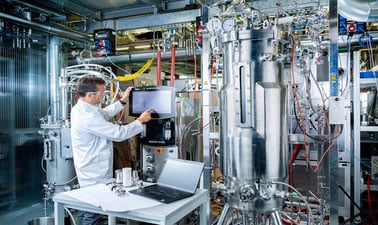Do you want to know what is a bioreactor and how is it operated? How are cells cultivated for biopharmaceutical production, and what are the difficulties? In this course, you will learn the basic techniques for the successful cultivation of mammalian, plant, and stem cells.

Course Details
| Language | English |
| Duration | 8 weeks |
| Effort | 5 hrs/week |
Description
Over the past 20 years, many aspects of cell cultivation techniques have become increasingly important. Today, animal and human cell cultures are used to produce antibodies to treat cancer and autoimmune and inflammatory diseases. In addition, these cells are of interest for vaccine production and gene therapies.
The current focus is on sustainability, therefore plant cell and tissue cultures have recently been used in commercial products, active ingredients in cosmetics, and food additives, and they are also used to make therapeutic enzymes. That, however, is not all. Human stem cell-based therapies and human on-chip models for testing cancer drugs and therapies are becoming more and more attractive.
Our course will provide you with a solid foundation in how to successfully cultivate the most commonly used cells for these applications. It will prepare you for the practice when you are handling these cells in the laboratory and at the same time will help you to better understand the language/concepts used by cell culture technologists. The focus will be on Chinese hamster ovary cells - CHO cells for short, mesenchymal stem cells, and plant suspension cultures.
What you will learn
- Types, design, and operation of bioreactors
- Process modes used in biotechnology
- Characterization and evaluation of cultivation systems
- Fundamentals of cell biology
- Metabolism of mammalian, stem, and plant cells
- Cultivation media and additives
- Routine working techniques in the laboratory
- Process scale-up and optimization
- Products and clinical application of stem cells
Plan
This course consists of six units: a general introduction, the actual four teaching blocks, and the final test. The following contents are covered:
Course Organization and introduction
Technical basics
Bioreactor systems
Common methods of oxygen supply
Process modes
Important transport phenomena
Mammalian cell culture technology
The mammalian cell
Mammalian cell metabolism and culture media
Main routine working
Inoculum production
Dominating production bioreactors
Monoclonal antibody production
Stem cell cultivation
Introduction and stem cell basics
Human mesenchymal stem cells
hMSCs – Analytical methods
In vitro expansion of hMSCs
Plant cell culture technology
Introduction to plant cells
Plant cell media
Cell and tissue culture types
Routine working in the lab
Cultivation systems
Exam and evaluation
In the beginning, all organizational frameworks such as the evaluation are explained and participants can get in touch with each other via the forum.
In the 1st block "Technical basics", the technical fundamentals for the use of cell cultures in biotechnology are described. This section forms the foundation for the following blocks and will be taken up again in all subsequent units. Even if you are not a technophile, you should follow this section thoroughly, as many connections will only become apparent in the following units.
In the 2nd block, the cultivation of animal cell cultures is highlighted, with an emphasis on Chinese hamster ovary (CHO) cells. These are the most used cells for the production of monoclonal antibodies and therefore of crucial importance in pharmaceutical biotechnology.
The 3rd block deals with stem cells, with the main focus on human mesenchymal stem cells (hMSCs). This pioneering technology is the spotlight of research and will develop its full potential in the coming decades. Many working techniques from the 2nd Block can also be used here.
Block 4 will focus on plant cell cultures. Work in this field has been ongoing for a long time, but recent developments in cellular agriculture have brought a breath of fresh air. Although the basic reactor technology is similar to that of mammalian and stem cells, the working techniques used are very different from the previous blocks.





